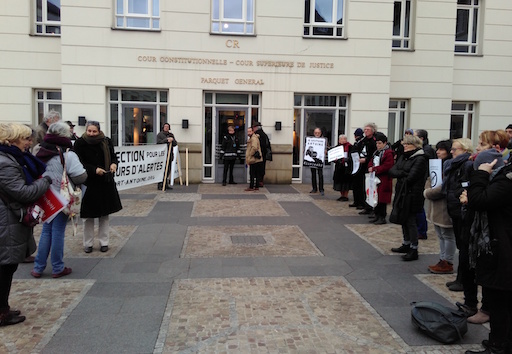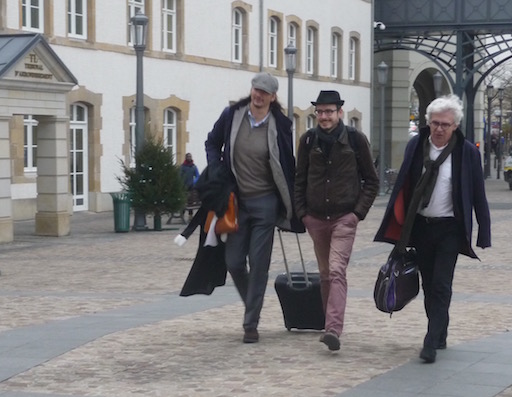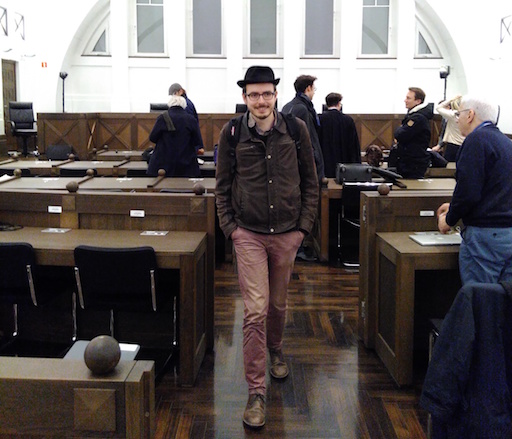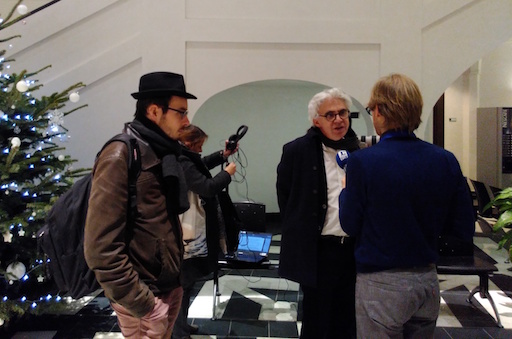LuxLeaks Appeal trial:
Second hearing
Ongoing support
On Monday, December 19th, some fifty citizens –mostly coming from Lorraine (France) with Antoine’s support committee bus— welcomed the accused ones at their arrival in front of the Court building. Continuous support is still on… Thank you!

Édouard Perrin’s interrogation
Prosecutor John Petry explains at the beginning of the hearing that the prosecutors decided to appeal last June’s judgment for the Court to be able to re-examine all facts jointly. According to Petry, a misinterpretation of the facts recognized in the first instance led to the acquittal of the journalist Édouard Perrin. Petry requests again his acquittal, but this time due to the principle of the journalist’s freedom of expression, as justified by Article 10 of the European Convention on Human Rights.
Then, Mr. Reiffers, president of the Court of Appeal, hears Édouard Perrin. Unsurprisingly, Perrin’s hearing confirms his already clearly established first instance statement. Mr. William Bourdon, one of Antoine’s lawyers, asked Perrin to recapitulate the context in which Antoine transmitted the documents, after “several hours” of discussion and hesitation. The journalist is very clear: only the “nominative and massive” aspect of the documents have ensured the public utility of the revelations.

The prosecutor’s indictment
The hearing then continues with the prosecutor’s indictment. During long and very technical developments, John Petry examines in detail the criteria for applying the European Court of Human Rights’s jurisprudence.
This jurisprudence does specify that whistleblower’s protection under Article 10 of the European Convention on Human Rights is subject to compliance with a series of criteria:
- the public interest in the disclosed information
- the authenticity of the disclosed information
- the whistleblower’s good faith
- the subsidiarity (the whistleblower disclose the information step by step, without going beyond what is necessary)
- the detriment caused (the detriment caused must be “balanced” against the interest of disclosure according to a principle of fair balance)
In addition, a sixth criterion applies to the State, which must establish the severity of the sanction proportionally to the recognized infringements.
Several criteria are validated
According to John Petry, several criteria are fulfilled: the revelations are effectively of public interest and the revealed documents are authentic.
In his preliminary note, the prosecutor disputed the application by Antoine Deltour and Raphaël Halet of the principle of subsidiarity, while he now seems to grant them respect for that criterion in his submission: according to him, Deltour and Halet had “no other choices than addressing the public”.
Good faith is challenged
On the other hand, John Petry states that Antoine’s good faith cannot be recognised already at the time when the documents were copied, in October 2010. Antoine –who is not a “tax expert”– would have taken the documents “by opportunity”. Petry concedes a “critical attitude towards tax optimization”, but for him, this simple “intellectual curiosity” does not correspond to the approach of a whistleblower acting in good faith!
The Prosecutor seemed to invent a new criterion to the European Court of Human Rights’s jurisprudence by requesting that whistleblowers should have “firm, established intentions” since the very early stage of their action. Antoine is therefore ironically blamed for the hesitation and qualms he faced before delivering the thousands of pages of confidential material he had in his hands.
Raphael Halet’s good faith is not called into question during the indictment.
The principle of fair balance
The Prosecutor then examines the principle of fair balance applied to the disclosure of documents. The detriment suffered by the civil party –it’s worth recalling that the latter merely claims 1 symbolic euro- would be all the more serious because the documents disclosed were confidential. The public prosecutor clearly intends to oppose the protection of professional secrecy on one hand to the whistleblower’s protection on the other hand.
In an intellectual construction exercise, John Petry tries to list the various options available to Antoine, in possession of the documents:
- to renounce to any disclosure;
- not to disclose the documents but only a description of the information contained;
- to disclose only anonymized parts of the documents;
- to disclose only a few documents, as they are;
- to transmit all the documents to the journalist, as they are, but ensuring that the information contained is circulated only in a limited way;
- to transmit all the documents to the journalist, without any restriction on their circulation;
- to disclose all the documents to the public.
The Prosecutor considers that only the first four options would have been relevant. He declares that, by submitting the documents without restriction to the journalist, Antoine “disregarded the principle of fair balance”. But what would have been the repercussions of such limited revelations?
Regarding Raphaël Halet, the prosecutor considers that, since the leaked facts were public, disclosure was not necessary. The principle of fair balance would therefore not be respected.
A 6 months jail sentence against Antoine
Prosecutor John Petry therefore points out that, in 2011, during the transmission of documents, Antoine would have respected only 4 of the 5 criteria of the ECHR. In 2010, when copying documents, only 3 criteria would be recognized. In proportion to the damage suffered, Petry requires a “reduced” sentence of 6 months jail, suspended time, as well as a fine.
Against Raphael Halet, which he considers to respect 4 of the 5 criteria of the ECHR, Petry requires “only” a fine (amount not specified).
As expected, a confirmation of the acquittal is requested for Édouard Perrin.

The trial’s next steps
The next hearing will take place on Wednesday, 21 December. It should begin with Mr Hansen’s pleading for the civil party, followed by Mr Bourdon and Mr Penning pleadings for Antoine Deltour’s defense.
At least one additional hearing will be scheduled in January 2017 to hear Ms Nalepa and Mr Colin's arguments for Raphaël Halet’s defense, as well as those of Mr Chappuis and Ms Hénon for the defense of Édouard Perrin.
